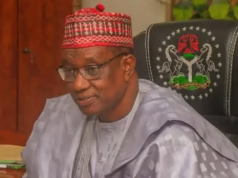States Have No Excuse Not to Pay Above N70,000 Minimum Wage, Says Employers’ Association (NECA)
September 3, 2025 – The Nigeria Employers’ Consultative Association (NECA), the umbrella organization for private sector employers, has declared that state governments have no reasonable justification for failing to pay their workers more than the newly legislated N70,000 national minimum wage.

Speaking during an interview on Channels Television’s “The Morning Brief,” NECA’s Director General, Mr. Adewale Smatt-Oyerinde, argued that the significant surge in federal allocations to states has rendered the common excuse of financial incapacity obsolete. He urged governors to look beyond the federal benchmark and consider the severe impact of the rising cost of living on their workforce.
Increased Federal Allocations Weaken ‘Inability to Pay’ Claims
Mr. Smatt-Oyerinde’s central argument is that the financial landscape for state governments has changed dramatically. With monthly revenues from the Federation Account (FAAC) having increased substantially since 2023, he insisted that states are now in a much stronger position to improve worker remuneration.
This new reality, he contended, dismantles the long-standing claim by some governors that their states cannot afford to pay a living wage, let alone one that exceeds the national minimum.
The new minimum wage bill, which raised the national benchmark from N30,000 to N70,000, was signed into law by President Bola Tinubu in July 2024 after extensive negotiations between the government, labour unions, and the organized private sector.
Pacesetter States Raise the Bar for Worker Remuneration
NECA’s position is bolstered by the actions of some state governments that have already surpassed the federal minimum, setting a new standard for others.
In late August, Imo State Governor Hope Uzodimma announced a new minimum wage of N104,000 for the state’s civil servants.
Shortly after, Ebonyi State followed suit, approving a new minimum wage of N90,000.
Smatt-Oyerinde maintained that these developments demonstrate that paying above the N70,000 threshold is not only possible but necessary. “No state really has an excuse in the context of the current reality to stay at N70,000, especially with people struggling with the price of petrol,” he said.

The Critical Link Between Fair Wages and Productivity
The NECA boss stressed that paying fair wages is not merely an expense but a crucial investment in national productivity. He argued that an underpaid and struggling workforce cannot be expected to perform optimally.
“If you are hungry, if you have issues with shelter and transport, hardly would you be productive at work,” he explained. “Whatever will improve productivity will increase motivation, especially within the context of ongoing reforms.”
He urged state governors to view their civil service as the “engine that drives the system” and to treat their employees as vital contributors to economic growth. Echoing a core principle of the International Labour Organization (ILO), he concluded that “workers are not commodities.”
Tackling the Broader Cost of Living Crisis
While advocating for higher wages, Smatt-Oyerinde also noted that the intense focus on minimum wage is a symptom of a larger problem: the high cost of essential goods and services. He called on governments to intensify efforts in providing palliatives and addressing core issues like food security, transportation, and housing.

“Once you deal with that, the conversation would not really be about minimum wage because the quantum of that N70,000 will be able to buy enough for an average household,” he concluded.
Join Our Social Media Channels:
WhatsApp: NaijaEyes
Facebook: NaijaEyes
Twitter: NaijaEyes
Instagram: NaijaEyes
TikTok: NaijaEyes





